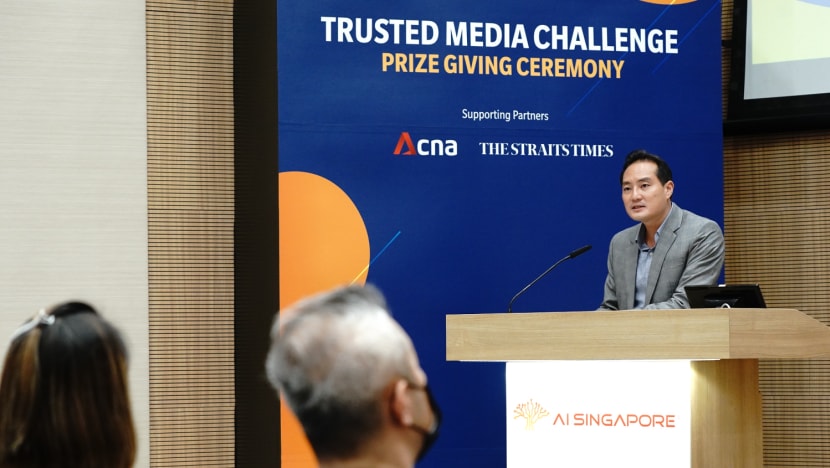Singapore takes a 'whole-of-society' approach to combat misinformation: Tan Kiat How

Minister of State for Communications and Information Tan Kiat How speaking at the Trusted Media Challenge prize giving ceremony. (Photo: Ministry of Communications and Information)
SINGAPORE: To fight misinformation, Singapore takes a "whole-of-society approach", which includes a "strong core" of local news media companies trusted by its viewers, listeners and readers, said the Minister of State for Communications and Information Tan Kiat How on Friday (Apr 29).
Speaking at the prize-giving ceremony for the Trusted Media Challenge - a competition on using artificial intelligence to combat fake media - Mr Tan said apart from technology, a "broader set of measures across society" must also be employed in the battle against misinformation.
He outlined four aspects of this whole-of-society approach, one of which was the role of local news media companies.
They "must play an important role as trusted interlocutors in this global marketplace of ideas, to inform and engage our citizens", he said.
"They present an authoritative source of information for our citizens in an online space where it is sometimes unclear if a piece of information is true or false."
"COVID-19 INFODEMIC"
He also pointed to legislation as part of the approach, specifically the Protection from Online Falsehoods and Manipulation Act (POFMA), which he described as "instrumental in Singapore's fight against the COVID-19 infodemic". As of Mar 31, almost 60 per cent of POFMA cases were COVID-19 related, Mr Tan said.
POFMA correction directions against vaccine misformation, which allows the public to read both falsehoods and facts, have contributed to Singapore’s high vaccination rates, Mr Tan asserted. As of Friday, 96 per cent of the eligible population are fully vaccinated.
NURTURING AN "INFORMED PUBLIC"
The third aspect of a whole-of-society approach in fighting information is to nurture an "informed public", Mr Tan said.
"An informed public that is aware of the threat of misinformation and can critically access the trustworthiness of the information received will make it harder for misinformation to take root," said Mr Tan.
He cited the National Library Board's S.U.R.E. (Source, Understand, Research, Evaluate) Programme as an example of public education that can help people be responsible producers and consumers of information.
He added that the Government also publishes accurate information to reduce the space for misinformation, in English and various other languages across a variety of platforms. This includes the official gov.sg Whatsapp account, which is available in four languages and has more than 1.2 million subscribers.
"However, the Government cannot do this alone. We welcome the participation of the private and people sectors."
And finally, to combat misinformation, building a robust fact-checking ecosystem is also key, said Mr Tan.
"High-quality fact-checks take up a lot of resources, and it is challenging for fact-checkers to work alone. Hence, collaborations are important," said Mr Tan. He highlighted the Asian Fact-Checkers Network, which brought together fact-checkers and stakeholders from related sectors such as media and academia to share best practices and exchange knowledge.
Mr Tan said he is heartened to see some tech companies playing their part by working with independent fact-checkers to review the content on their online platforms.
"Tech companies can bring a lot to the table, whether in terms of co-creating technological solutions, amplifying the results of fact-checks, or investing in programs and initiatives to support the larger fact-checking ecosystem."

















